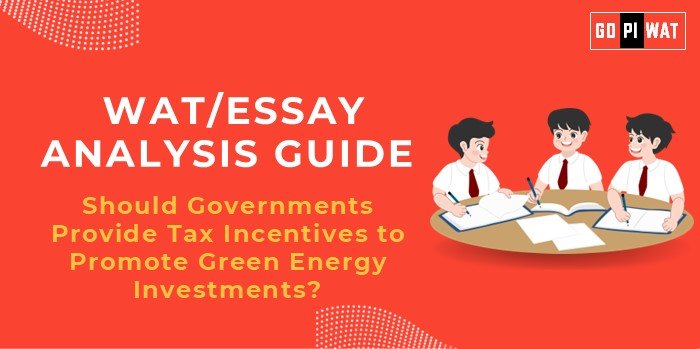📋 Written Ability Test (WAT) / Essay Analysis Guide: Should Governments Provide Tax Incentives to Promote Green Energy Investments?
🌐 Understanding the Topic’s Importance
The topic connects economics, sustainability, and governance, vital for B-school discussions on strategy, finance, and global impact.
📝 Effective Planning and Writing
- Time Allocation:
- ⏱️ Planning: 5 minutes
- 🖋️ Writing: 20 minutes
- 🔍 Review: 5 minutes
- Preparation Tips: Research key statistics, understand stakeholders, and focus on policy implications.
💡 Introduction Techniques for Essays
- Contrast Approach: “While fossil fuels dominate global energy, renewables represent the fastest-growing sector, driven by tax incentives.”
- Solution-Based Start: “Tax incentives provide a viable solution for reducing carbon footprints without stalling economic growth.”
📚 Structuring the Essay Body
- 📈 Achievements:
- Highlight economic growth, job creation, and reduced emissions.
- Example: U.S. renewable energy investments grew by 30% due to tax benefits.
- 🔄 Challenges:
- Discuss policy uncertainty and infrastructure deficits.
- Comparative Analysis: Success in the EU vs. mixed results in Asia.
- 🚀 Future Outlook:
- Propose integrating green incentives with technological innovations and stricter regulations.
🏁 Concluding Effectively
- Balanced Conclusion: “Tax incentives drive green investments but require robust policy support for long-term success.”
- Global Comparison: “Nations excelling in renewable adoption showcase the importance of consistent incentives.”
📊 Analyzing Successes and Shortcomings
- 🎯 Achievements: Job creation, reduced emissions, economic diversification.
- ⚠️ Challenges: Funding, global inequality, and market volatility.
🌍 Recommendations for Sustainable Progress
- 📘 Long-term policy consistency.
- 🤝 Public-private collaborations for infrastructure.
- 🌐 Expanding incentives to emerging economies.
✍️ Sample Short Essays
1. Balanced Perspective:
“Tax incentives promote renewable energy, aligning economic growth with environmental goals. However, inconsistent policies pose risks, requiring integrated efforts from governments and industries.”
2. Solution-Oriented:
“By offsetting high initial costs, tax incentives make green energy viable. Expanding these benefits globally can expedite the transition to a sustainable future.”
3. Global Comparison:
“Europe’s green tax policies exemplify the role of consistent incentives. Adopting similar frameworks in developing nations can bridge the gap in renewable adoption.”


